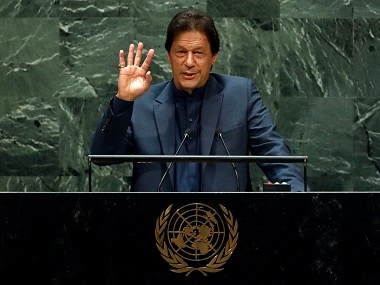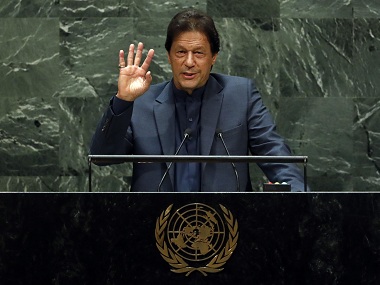Pakistan has been given another four months by the Financial Action Task Force (FATF) to act strongly on two issues: money laundering and terror financing. The country made some progress since the last deadline was given in June, but most of the things asked of it have not been delivered. “To date, Pakistan has only largely addressed five of 27 action items, with varying levels of progress made on the rest of the action plan,” the FATF said. Of the other countries on the grey list, Sri Lanka, Tunisia and Ethiopia were removed. Three other nations joined the grey list: Iceland, Mongolia and Zimbabwe. Only two nations are on the black list: Iran and North Korea. [caption id=“attachment_7416641” align=“alignleft” width=“380”]  File image of Pakistani prime minister Imran Khan. AP.[/caption] Readers should know that the demands made by the FATF are principally about Pakistan’s ability to implement an action plan it itself put together. And secondly that much of this has to do with the transfer of money, a problem that is regional and cultural and not specific to Pakistan. It was Pakistan’s finance minister Hammad Azhar who represented the country before the FATF. The FATF wanted Pakistan to continue “demonstrating that authorities are identifying cash couriers and enforcing controls on illicit movement of currency and understanding the risk of cash couriers being used for terror financing.” Let us try and understand what the issue really is and why it is that Pakistan is struggling to get off the grey list. The cash courier is a part of the networks that operate outside the usual channels in South Asia, including for the financing of the diamond trade. It will not be easy for Pakistan or India to eliminate such entrenched systems even when they take strong action. India’s government deliberately put its economy through extreme pain in 2016-17 because the problem of black money was thought to be unaddressable through conventional means. However, the problem of black money, which is what money is called before it us laundered into white, has not gone away. The second problem that Pakistan has is that it is not able to differentiate between groups that are linked to religion, social service and community service, but also to violence. There is a parallel with India but that’s a topic for another day. In Pakistan, groups like the Lashkar-e-Taiba and Jaish-e-Muhammad have very large presence in community service through their affiliated religious formations. When there is a flood or an earthquake, it is these groups that send large numbers of volunteers and supplies to the affected areas. Because of this they can have an open presence in urban areas for fundraising and mobilisation. Also because of this they can mingle more easily into politics, offering support to candidates and framing not just policy and law but also national outlook. Of course, this is dangerous and has to be countered by Pakistan but again, just like the black money issue, this is cultural and widespread and will be difficult to do. After 9/11, and particularly after the attack on the Indian Parliament, then president Pervez Musharraf acted against the Deobandi and Salafi groups. The effect was immediate. In India, fatalities from terrorist and related violence collapsed in Kashmir. It peaked with 4,000 deaths in 2001, then dropped to 3,000 in 2002, then 2,000 in 2003, then 1,000 in 2004, then 500 in 2008 and 300 in 2009. Meaning less than 10 percent of the violence seen at peaks. It remained stable at that figure and, in fact, fell further under Manmohan Singh, though it is now going back up again. Last year’s 450 fatalities were the highest in 12 years. This year may be worse. India has fenced the Line of Control and the Jammu and Kashmir authorities and police believe that exfiltration and infiltration have become very difficult. Meaning that Pakistan’s role is limited and locals are unable to cross over to receive training. It is essentially those Kashmiris who are motivated enough to fight against the Indian State who are keeping the Indian Army occupied. The fallout of this action against groups it nurtured was felt immediately in Pakistan. The violence that they had exported all these decades began showing its teeth at home. Terrorism-related fatalities in all of Pakistan were 166 in 2000. When Musharraf tried to shut them down, terror exploded in Pakistan’s cities. Fatalities went from 900 in 2004 to 1,400 in 2006, to 3,000 in 2007, and 6,000 in 2008. They peaked at 11,000 in 2009, a year after Musharraf left. Since then they have been in decline, falling to 7,000 in 2010, 6,000 in 2011, 5,000 in 2013, 3,000 in 2015, 1,000 in 2016 and 600 last year. This year, 2019, will be the most peaceful year in Pakistan in almost two decades. India’s governments have always told their people all terrorism is the product of Pakistani mischief. If we believe that Pakistan is responsible for violence going up, we have to accept that it is also responsible for violence going down. This we have not been willing to do. Of course, the fact is that today the violence in Kashmir is almost entirely local. It is the product of Indian policies over decades, the Indian media’s recent hatred of Kashmiris, the Indian judiciary’s refusal to protect their fundamental rights, and our absolute refusal to consider with sympathy their human rights. Even if Pakistan faces sanctions in February and is punished for its many mistakes over the decades, this will not deliver any relief to India on terrorism, other than the satisfaction that the enemy has been humiliated.
The demands made by the FATF are principally about Pakistan’s ability to implement an action plan it itself put together
Advertisement
End of Article
Written by Aakar Patel
Aakar Patel is a writer and columnist. He is a former newspaper editor, having worked with the Bhaskar Group and Mid Day Multimedia Ltd. see more


)

)
)
)
)
)
)
)
)



